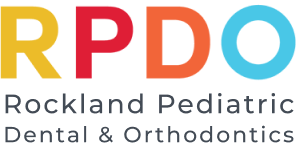At Rockland Pediatric Dental & Orthodontics, we want you to love your smile!
We love creating great smiles for patients of all ages, and we offer a variety of orthodontic treatment options — from traditional braces to clear retainers — to fit your oral health needs.
Does my child need braces? How can orthodontic treatment help my child’s smile?
While a bright smile can help us all feel confident, orthodontia is about more than just appearances.
Malocclusions, or “bad bites” characterized by upper and lower teeth that don’t align, can affect the way you chew, speak, or smile — and it can even lead to more serious (and expensive) oral health problems later in life.
Some of the common conditions that can be corrected with orthodontic treatment are:
- Crowded Teeth: Teeth that are crooked, rotated, or overlapping.
- Excessive Overjet: The upper jaw or upper front teeth are much further forward than the lower front teeth or jaw.
- Underbite: The lower jaw or teeth are too far forward, or the upper jaw or teeth are too far back.
- Excessive Overbite: The upper teeth excessively overlap the bottom ones.
- Protrusion: The upper teeth stick out and do not fit with the lower front teeth.
- Excessive Spacing: Teeth that have wide gaps between them.
What is two-phase orthodontic treatment? When should my child see an orthodontist?

We recommend that children schedule a complimentary consultation with an orthodontist in our New City office as early as age seven. This may seem young — especially if you had braces as an older child yourself — but it’s the perfect time to understand if their smile can be treated with two-phase orthodontic treatment.
Two-phase orthodontic treatment simply means that treatment is done at two separate times — typically before and after all of the patient’s permanent teeth emerge. Not everyone who has Phase I treatment will need Phase II treatment, but since the two phases treat different sets of problems, many children benefit from both.
Here’s what to expect from each phase of treatment:
Phase I Orthodontic Treatment
The first phase of orthodontic treatment is done before all of the permanent teeth erupt because this is the best time to fix or prevent problems with the way the jaws are growing. Treatment at this time can address the amount of room the permanent teeth have to enter the mouth, as well as any conditions that could cause tooth damage if left untreated.
During this time in a child’s development, the upper jaw bone is still growing and can be gently guided into a good position. Treatment in Phase I is typically done with an appliance in the mouth or with limited (not full-mouth) braces. After Phase I, your child’s orthodontist may recommend a temporary retainer to maintain the positive changes as the rest of the permanent teeth erupt.
Your Rockland orthodontics team will determine whether Phase II treatment is necessary at a later time. Children who have Phase I treatment often have a shorter Phase II treatment and can sometimes avoid additional procedures such as extractions.
Phase II Orthodontic Treatment
Once all of the permanent teeth are in place, Phase II treatment can begin to bring the teeth into a good position that is in harmony with the jaws, lips, and other teeth. This is often done with a full set of braces or, for certain cases, with a series of clear aligner trays.
During this phase, the lower jaw bone is growing, which makes Phase II the perfect time to address lower jaw issues such as overbites.
No matter what age your child is, it’s never too late to map out the orthodontic treatment plan that will create their best smile. Make an appointment to learn more!
